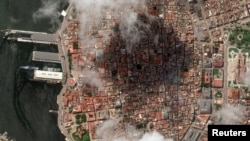New satellite images of Cuba show signs the country is installing improved intelligence capabilities at four military bases with suspected links to China, potentially providing Beijing with a network of facilities that could be used to spy on the United States.
The imagery, presented in a report Tuesday by the Washington-based Center for Strategic and International Studies, was taken in March and April. It indicated new or recent construction at three sites near the capital, Havana, as well as work on a previously unreported site not far from the U.S. naval base at Guantanamo Bay.
“Without access to classified materials, pinpointing the specific targets of these assets is nearly impossible,” the report said. “Nonetheless, the growth of space-monitoring equipment at sites like Bejucal and Calabazar is notable given that Cuba lacks its own satellites or space program.”
Bejucal is the largest of the four sites, according to CSIS analysts and first came to prominence during the 1962 Cuban missile crisis, when the base was used to store nuclear weapons for the Soviet Union.
More recently, it has gained prominence as a major signals intelligence monitoring station, suspected to be tracking electronic communications for China.
The new satellite pictures show evidence that Bejucal has seen expansive updates, including a new electronic antenna enclosure.
Two other sites near Havana — Wajay and Calabazar — have seen growth as well, with CSIS analysts citing evidence of an expanding and evolving mission, including the installation of antennae, radar dishes and other equipment that could help those using it to monitor satellites.
The final site, El Salao, appears to be still under construction. But its location, not far from the U.S. naval base at Guantanamo Bay near the city of Santiago de Cuba, and the structures themselves, could be cause for concern for the U.S.
The imagery collected by CSIS shows progress on what appears to be an antenna array with a diameter of 130 to 200 meters (425 to 655 feet). Similar arrays, according to the analysts, have shown the ability to track signals up to 15,000 kilometers (9,300 miles).
The U.S. Office of the Director of National Intelligence declined to comment on the CSIS report. But it follows a report last year by The Wall Street Journal that China was paying Cuba several billion dollars to build a spy facility.
U.S. officials later said that China had upgraded its intelligence facilities in Cuba in 2019 but that U.S. pushback had prevented Beijing from achieving its goals.
“We're confident that we can continue to meet our security commitments,” said Pentagon press secretary Major General Pat Ryder while briefing reporters Tuesday.
“We know that the PRC [People’s Republic of China] is going to continue to try to enhance its presence in Cuba, and we will continue to keep working to disrupt that,” he said in response to a question from VOA. “We're continuing to monitor this closely, taking steps to counter it.”
China on Tuesday rejected the findings of the CSIS report, with the spokesperson of the Chinese Embassy in Washington calling them “nothing but slander.”
“The U.S. side has repeatedly hyped-up China's establishment of spy bases or conducting surveillance activities in Cuba,” Liu Pengyu told VOA in an email.
“The U.S. should immediately stop its malicious smearing of China,” Liu said, adding, “The U.S. is no doubt the leading power in terms of eavesdropping and does not even spare its Allies [sic].”
Cuba also pushed back against the CSIS report, singling out a write-up in The Wall Street Journal.
“Without citing a verifiable source or showing evidence, it seeks to scare the public with legends about Chinese military bases that do not exist and no one has seen,” according to a post by Cuban Deputy Foreign Minister Carlos Fernandez de Cossio on the X social media platform.
The CSIS report says monitoring stations in Cuba could help China to acquire needed capabilities and insights as it tries to militarily surpass the United States.
“Collecting data on activities like military exercises, missile tests, rocket launches, and submarine maneuvers would allow China to develop a more sophisticated picture of U.S. military practices,” the report said.
“Cuban facilities would also provide the ability to monitor radio traffic and potentially intercept data delivered by U.S. satellites as they pass over highly sensitive military sites across the southern United States,” the report said.
Such monitoring stations could also help China gain access to what the report describes as a “treasure trove of data” from commercial communications transiting the southeastern U.S.










